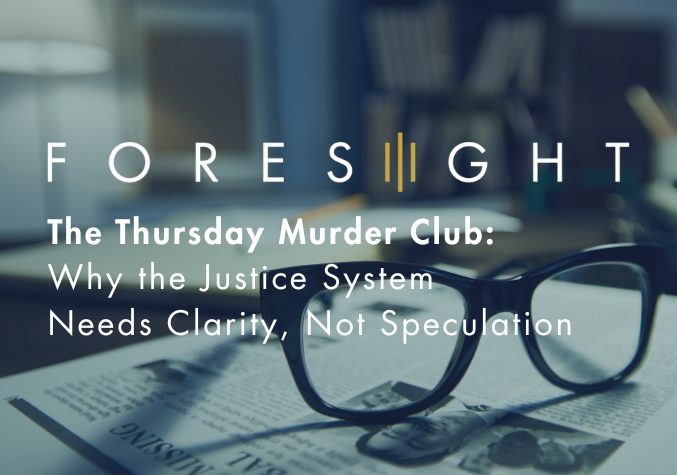News

Sep 3, 2025 by Foresight
The Thursday Murder Club: Why the Justice System Needs Clarity, Not Speculation
With the release of Netflix’s The Thursday Murder Club, the public’s fascination with amateur detectives has taken centre stage once again. Richard Osman’s characters delight audiences by unravelling complex mysteries from their retirement home, reminding us of the timeless appeal of crime-solving as a pastime.
But while fictional sleuthing is entertaining, the rise of amateur investigation in real life, from private investigators to online true crime communities, raises significant questions for the justice system. What happens when curiosity collides with the courtroom?
The Rise of Amateur Sleuthing
Private investigation has long been a presence in the UK, with professionals specialising in cases involving fraud, family disputes, and missing persons. Yet unlike regulated expert witness roles, private investigation remains largely unregulated, creating uncertainty about standards and accountability.
At the same time, the internet has transformed crime-solving into a participatory hobby. Online forums, podcasts, and social media groups have given rise to communities devoted to dissecting unsolved cases. The “pull of true crime” has become a cultural phenomenon, blurring the line between entertainment and investigation.
Solicitors are increasingly feeling the impact. Family lawyers report meeting “sleuth clients” who arrive with research, theories, and so-called evidence gathered online. While often well-intentioned, this type of material is usually inadmissible and can even harm a case by raising false expectations or diverting attention from the facts.
The Problem with Amateur Evidence
The primary concern with amateur sleuthing is its reliability. Courts do not require speculation or theory, they require impartial fact.
Theories generated by online communities may be compelling, but are rarely based on rigorous or scientifically valid methods. Similarly, while private investigators may uncover useful information, their findings are not always supported by the professional standards and compliance required for court.
In a justice system already strained by backlogs and resource shortages, introducing unreliable evidence can create delays, confuse proceedings, and put undue stress on victims, witnesses, and defendants. Without impartiality and transparent methodology, such evidence cannot withstand the scrutiny of cross-examination.
The Value of Expert Witnesses
Expert witnesses provide a vital counterbalance to the rise of amateur investigation. Their role is not simply to provide an opinion, but to offer impartial, evidence-based analysis that helps the court understand complex issues.
In family law, this might involve assessing a parent’s capacity to care for their child. In criminal cases, it could mean determining a defendant’s fitness to plead. In inquests, experts are often required to establish medical causation or systemic failings. In immigration, cultural or psychological expertise may help determine the credibility of an asylum claim.
These contributions go far beyond speculation. They are rooted in professional training, years of experience, and a duty to the court. Expert evidence is presented in structured reports, often supplemented by oral testimony, and is designed to withstand the highest levels of scrutiny.
Foresight’s Role in Ensuring Quality
At Foresight, we recognise that reliable expert evidence is not optional. It is essential. Our role is to connect legal professionals with the right expert, ensuring that the evidence presented is robust, impartial, and delivered on time.
We maintain a carefully vetted panel of psychologists, psychiatrists, medical specialists, forensic experts, and cultural experts. Each professional is supported by our Expert Liaison, who ensures that they are not only qualified but also fully prepared to meet the demands of court proceedings.
Our account managers and administrative teams oversee every stage of the process, from briefing experts to ensuring reports are delivered in the correct format. In high-pressure environments where deadlines are critical, this infrastructure allows us to respond quickly without compromising quality.
Why This Matters Now
The UK justice system is facing unprecedented challenges. Criminal backlogs are stretching into years. Family cases continue to rise in complexity, particularly around domestic abuse and safeguarding. Coroners are issuing more Prevention of Future Deaths reports, which raises expectations for clinical and systemic analysis. Meanwhile, immigration law is undergoing significant reform, increasing the demand for expert cultural and psychological evidence.
In this environment, courts cannot afford delays or unreliable testimony. They need clarity, impartiality, and evidence that can withstand scrutiny. While amateur sleuthing may capture the public imagination, it cannot provide the professional insight that cases demand.
Conclusion: Experts, Not Speculation
The Thursday Murder Club is a delightful piece of fiction, and online sleuthing can be an engaging hobby. But real cases involve real people and real consequences. Whether it’s a child custody decision, a criminal trial, or an immigration appeal, speculation is no substitute for professional expertise.
Our mission is to ensure that every case receives the support of the right expert at the right time. We bridge the gap between complex legal needs and professional, court-ready evidence, helping to deliver justice not through guesswork, but through clarity and expertise.
FIND YOUR
EXPERT WITNESS
CALL OUR TEAM ON
0330 088 9000
NEWSLETTER SIGN-UP
Stay up-to-date with all the latest news in the industry by signing up to our newsletter. You're welcome to unsubscribe at any time and we'll always treat your personal details with the utmost care.

